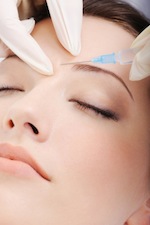Does Botox Belong in the Dentist’s Office? It Depends on Who You Ask.
 Back in the uncomplicated good old days of healthcare marketing, the many and various medical professions, specialties and subspecialties were neatly organized by basic anatomy. Podiatrists, for example, worked on stuff “below the knee.” A patient with a snoring problem might be referred to an “ear-nose-throat” specialist. And dentists cared for your teeth and gums.
Back in the uncomplicated good old days of healthcare marketing, the many and various medical professions, specialties and subspecialties were neatly organized by basic anatomy. Podiatrists, for example, worked on stuff “below the knee.” A patient with a snoring problem might be referred to an “ear-nose-throat” specialist. And dentists cared for your teeth and gums.
It’s a bit of over simplication of course, but the “territorial” lines were clear and there wasn’t a lot of crossover. That was yesterday. Today the medical work zones among and between professionals are less well defined.
For example, a small but growing number of dentists in some states now advertise Botox (r) cosmetic procedures in their practice mix. Botox (medical grade botulinum toxin) is popularly available as a treatment to soften and relax facial frown lines and crows feet—most commonly provided by cosmetic and plastic surgeons and medispa facilities.
In the United Kingdom, non-invasive cosmetic procedures, such as Botox and dermal fillers, are commonly available from dentists. And the quickly changing landscape of healthcare delivery systems, the recent years of a troubled American economy, and increased competition have caused dentists (along with many other professions) to consider alternative services and revenue streams.
Botox may be appropriate in the medical or dental treatment of migraines and temporomandibular joint (TMJ) cases, making a specialized marketing service for cosmetic dental procedures crucial for highlighting these expanded service offerings. But should dentists be offering cosmetic Botox procedures?
First, it depends on where the practice is located—the rules vary from state to state. Some Minnesota dentists have been in the news recently where they are permitted to provide Botox facial procedures. But at least two other states—California and Nevada—reportedly don’t permit dentists to use Botox for appearance purposes.
Not surprisingly, some dentists (notably in Minnesota) are open to the idea of helping patients with bright smiles and fewer facial wrinkles. West River Dental Care’s Dr. Michael Skadron was quoted recently as saying, “As a dentist, I’m very well-trained in the musculature and anatomy of the face and I feel no other doctor can give an injection better than a qualified and experienced dentist.”
But not all dentists agree. Over 40 percent of respondents think dentists should concentrate on healthy teeth and gums, not Botox, according to an online poll among dentists.
Many doctors on the other hand comment online that they would recommend that patients see a physician who is board certified in dermatology, plastic surgery or with aesthetic specialty training.
What do you think? Please let us know where you stand in this changing and competitive landscape. You’ll find more info on our website pages for dental practices and medical practices.









